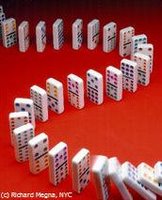Thursday, March 08, 2007
Wednesday, February 14, 2007
My Grandfather And Others
 As I deal with people, some of whom are very close to me, I think
of my grandfather, whom I have mentioned before. He died of
"fever" in his kidneys at 87 years of age, and it was said that if
you listened carefully at his grave, you could still hear his heart
beating. My point is that the way he chose to live was very
easy on his heart. I never saw him excited, and his lifelong
habit was to be 20 minutes early for everything. I remember him
on Sunday, with the horse and wagon ready outside, sitting reading
while waiting for the rest of us to appear. A couple of months
before he died, he had mowed the front lawn carefully with a
scythe, in preparation for our arrival from Halifax for the summer
vacation, and then had run over a mile to help put out a fire at
the creamery in which he held shares. He was part of a bucket
brigade bringing water from the lake, and this is how he developed
the kidney trouble that took him away about two months later.
As I deal with people, some of whom are very close to me, I think
of my grandfather, whom I have mentioned before. He died of
"fever" in his kidneys at 87 years of age, and it was said that if
you listened carefully at his grave, you could still hear his heart
beating. My point is that the way he chose to live was very
easy on his heart. I never saw him excited, and his lifelong
habit was to be 20 minutes early for everything. I remember him
on Sunday, with the horse and wagon ready outside, sitting reading
while waiting for the rest of us to appear. A couple of months
before he died, he had mowed the front lawn carefully with a
scythe, in preparation for our arrival from Halifax for the summer
vacation, and then had run over a mile to help put out a fire at
the creamery in which he held shares. He was part of a bucket
brigade bringing water from the lake, and this is how he developed
the kidney trouble that took him away about two months later.
With the exception of emergency situations like this, my grandfather was knowingly not under stress, and was always ready ahead of any appointed time. Not everyone is like my grandpa -- some like to see how close to the line they can come, and they frequently miss, some being late by a predictable 20 minutes, which seems to be the magic length of time to be late or early. For myself, I am on time for things. In fact, as a deadline creeps up on me, I resort to my training in radio and television before there was tape delay. This means that I tend to be about five minutes early for whatever is happening, and it is so calming that I do not know why everyone does not deliberately follow the example of my grandfather.
Sunday, February 11, 2007
American Express
 Because my wife is in a nursing home -- one of several types
of institutions specializing in reasonably comfortable, but very
expensive, accommodations for senior adults -- my finances,
which were looking better than for a long time, need careful
re-examination.
Because my wife is in a nursing home -- one of several types
of institutions specializing in reasonably comfortable, but very
expensive, accommodations for senior adults -- my finances,
which were looking better than for a long time, need careful
re-examination.Leave us begin with credit cards, most of which "save money" by allowing us to "take advantage" of golden, silver and brass opportunities, sometimes in very far away lands, where you can get great bargains by spending a few thousand to get there and, of course, back again (by this point in the sentence, I've forgotten who's taking advantage of whom). If I seem to be casting doubt on all these prospects and their premises, of course it is intentional. Anyway, back to my title, and the fact that I hold title to such a card, at least until AmEx gets tough with me, which I sincerely hope never happens.
To feel prosperous, I took out American Express a few years ago, and since I have an inherited Presbyterian conscience about money, I keep it paid with a warm feeling about these nice folks allowing me into this exclusive club of countless millions. I have an AmEx Gold Card, as well as a regular one, for all of which I pay an annual fee. But since these days there seem to be so many other credit angels offering me free money, I must stop and rein in the vanity, because that is all it is -- I refer you to Ecclesiastes: "All is vanity".
Unfortunately, since this is a blog post, which for me begins its life on the written page, my time has run out. To my credit, I've kept within my self-imposed one-page limit.
Thursday, February 08, 2007
Who Are You?
 Here in Canada, we are hearing much about nationhood, or at least
about nations. We have the
First Nations,
the
Quebec nation,
the
nation of Alberta,
and more
(Newfoundland?).
We hear also of the Catholics, who used to be the Roman Catholics,
and of course there are Greek Orthodox Catholics, Coptic Catholics,
and more. The word "catholic" is still used to mean "universal", as
in "catholic tastes", and "nation" means that beyond our borders,
all are foreigners. I'm afraid Humpty Dumpty has been at it again,
with his "words mean what I mean them to mean", and his firm
conclusion that what matters is "who is to be master -- that's all".
Here in Canada, we are hearing much about nationhood, or at least
about nations. We have the
First Nations,
the
Quebec nation,
the
nation of Alberta,
and more
(Newfoundland?).
We hear also of the Catholics, who used to be the Roman Catholics,
and of course there are Greek Orthodox Catholics, Coptic Catholics,
and more. The word "catholic" is still used to mean "universal", as
in "catholic tastes", and "nation" means that beyond our borders,
all are foreigners. I'm afraid Humpty Dumpty has been at it again,
with his "words mean what I mean them to mean", and his firm
conclusion that what matters is "who is to be master -- that's all". It is easy to insist on definitions, even legal definitions, in matters such as these, but in every case we can see a struggle for dominance, or at least for survival, and we find ourselves back for another reading of Instincts of the Herd. One thing is certain: the legal profession will always be with us. It is apparent that each of us wants to belong, and to defend the herd or group with which we identify ourselves. Of course, since each of us belongs to several herds, we cannot always be sure to which herd we are loyal at any one time. Is that herd geographic, ethnic, religious, economic, or other? Wolves don't have this problem, nor do ants. But we have this problem in abundance, even with the sexes, which now are three, or is it four?
So who are you? Who I am depends on where I am, and with whom I am. All right -- like the rest of us, I'm not sure.
Monday, February 05, 2007
Series Habits
 U-pun my word, my title is serious.
Habits are very serious things indeed. Without them, we would
have to figure out certain actions anew each shining or foggy
day. I suppose memory would help, but morning routines would be
matters for attention, rather than things to be done on
autopilot
while planning the day. So clearly habits are not all bad;
in fact, they make orderly life possible. And habits do come in
series -- one leads to the next, and they supplement
each other. We have a series of actions to get us up and cleaned
and dressed and looking our best for whatever sort of day we see
ahead. Then another series gets the car out and down the
driveway and navigating the morning traffic. We can arrive at work
having forgotten a very important errand that we intended to do
on the way, but which was not a part of our usual routine.
U-pun my word, my title is serious.
Habits are very serious things indeed. Without them, we would
have to figure out certain actions anew each shining or foggy
day. I suppose memory would help, but morning routines would be
matters for attention, rather than things to be done on
autopilot
while planning the day. So clearly habits are not all bad;
in fact, they make orderly life possible. And habits do come in
series -- one leads to the next, and they supplement
each other. We have a series of actions to get us up and cleaned
and dressed and looking our best for whatever sort of day we see
ahead. Then another series gets the car out and down the
driveway and navigating the morning traffic. We can arrive at work
having forgotten a very important errand that we intended to do
on the way, but which was not a part of our usual routine. Other habits cannot be regarded as good without some thought. We can gradually stay up later and later, and acquire all the ills of sleep deprivation. We can consistently stop in at the bar on the way home for a few drinks and some fried food, without consideration for calories or a history of family heart troubles or the possibility of having to breathe into a police machine for a routine alcohol check.
Clearly bad habits are hard to change, but good habits are wonderful. At the very best, we can put a good habit into the place of a bad one. The worst option is to pay habits no attention, and they will indeed look after themselves.
Thursday, February 01, 2007
Blogs: Servant, Master, Or Free Mouthpiece?
 I am now a veteran of fifty or so blog posts, but like all the rest
of you, I have cogitated for years, which for me is generations.
I have thought and written about my various opinions, and about
all the wisdom which must have been repeatedly worked out and then
lost again throughout the millennia. In light of this,
I am impressed beyond words (well, almost) by the arrival of this
form of communication called the blog, which, at the very least,
equals the invention of the printing press. Read that, and remember
that it is coming from one (me) who is regarded (by me and others)
as glum and difficult where words are concerned, and generally
not inclined to be effusive.
I am now a veteran of fifty or so blog posts, but like all the rest
of you, I have cogitated for years, which for me is generations.
I have thought and written about my various opinions, and about
all the wisdom which must have been repeatedly worked out and then
lost again throughout the millennia. In light of this,
I am impressed beyond words (well, almost) by the arrival of this
form of communication called the blog, which, at the very least,
equals the invention of the printing press. Read that, and remember
that it is coming from one (me) who is regarded (by me and others)
as glum and difficult where words are concerned, and generally
not inclined to be effusive. Blogs are wonderful. Vanity is served at once. If you don't listen, it is your fault. Also, by the very nature of the medium, your audience sorts itself out. Readers don't pay anything, so they really can't complain. Anyone can join in, rebut, whatever -- surely this is democracy, whatever that is, at its most lively and pushy. In the realm of human communication, blogs seem to me to be the atomic units that transistors are in the world of digital devices that surround us.
Having said all this, I am careful, questioning, and a little frightened about the future. I do not think that we, with our unique facility of language, are to be trusted with much. But at the same time, I don't want to stop the momentum of whatever it is that will emerge from the tunnel. Stay tuned.
Monday, January 29, 2007
Honesty? Impossible - But Negotiable, Of Course
 It seems obvious that nobody can ever be honest at all times.
Nor can we be absolutely against stealing and killing. These are
negotiable, as are many issues in life. Usually we are for
honesty and against killing and stealing, but killing can earn us
the highest medal for valour, and the morality of stealing certainly
depends on the circumstances, while complete honesty as to a loved
one's whereabouts may doom that person to death.
It seems obvious that nobody can ever be honest at all times.
Nor can we be absolutely against stealing and killing. These are
negotiable, as are many issues in life. Usually we are for
honesty and against killing and stealing, but killing can earn us
the highest medal for valour, and the morality of stealing certainly
depends on the circumstances, while complete honesty as to a loved
one's whereabouts may doom that person to death. No hunter is ever entirely honest with his prey. No soldier will reveal everything to the enemy who is trying to kill him. No starving colonized native is going to be completely forthright with the European plantation owner who forces him from his ancestral lands. In fact, it is ridiculous to consider the question of honesty except in relation to the more fine-grained question: Honest with whom? This brings us immediately to matters of loyalty, and thus to herds and the herd instinct. We risk getting into the biology of competing organisms, and even of our own tissues, which can reject very slightly different ones, or mistakenly identify self as foreign.
Many religious positions deal with absolutes. Often these are based on unexamined premises, which, for Heaven's sake (pun intended), must be the soul of dishonesty. All too often such stances remind us of Alice and Humpty, and his dictum that what really matters is who is to be master. So once again the question of honesty gives way to defining the terms we use, and to defining our interests in a situation. Perhaps clarity can be brought to the whole issue of honesty by one attempt to define its opposite: "A lie is an untruth told to someone who deserves to hear the truth".
Friday, January 26, 2007
Now I Feel Responsible
 My blog, a little over six months old, has become popular.
Until now, I have been able to write about anything that occurred
to me, not really caring how many people paid attention.
Now I feel I have a standard to uphold, and I fear this will
cramp my style -- which I didn't try to have.
No doubt this phenomenon is part of being or feeling responsible.
My blog, a little over six months old, has become popular.
Until now, I have been able to write about anything that occurred
to me, not really caring how many people paid attention.
Now I feel I have a standard to uphold, and I fear this will
cramp my style -- which I didn't try to have.
No doubt this phenomenon is part of being or feeling responsible. I have seen this happen before. When the Canadian Museums Association was put together, with little or no money, it had a real flavour because of the personalities of the eager volunteers. With time, and growth, and hired hands who saw to their own survival, quite naturally some of this flavour was lost. We oldsters hardly recognize it now, even if occasionally we receive some honour for our contributions in the past. I fear this will happen in the free, accidental world of blogs, including my own.
Part of this might be a holding back from subject matter or treatment that could offend some category of readers. Part might be an inclination to look for stuff which will be even more popular. Now there is a foot on the brake and a foot on the accelerator, if ever I've seen one (or two). No matter. Whatever happens, I know I am now a thoroughly hooked blogger.
Tuesday, January 23, 2007
It Bothers Me That I Have To Go
 Nowadays, no matter how much I try to put off decisions until later,
I must admit that everything seems to bother me. For example, my
writing bothers me, because I have to be careful to be legible,
even to myself. I am quite sure I have had a stroke (the final
medical diagnosis is still pending), a small one I suppose,
since I still drive a few weeks after my 93rd birthday. At this
age, I must say that I do delight in people's amazement when
I tell them how old I am. But under all this is the knowledge
that I am the oldest male on either side of my family, maternal
or paternal, and I know I must go fairly soon. I just don't like
the idea.
Nowadays, no matter how much I try to put off decisions until later,
I must admit that everything seems to bother me. For example, my
writing bothers me, because I have to be careful to be legible,
even to myself. I am quite sure I have had a stroke (the final
medical diagnosis is still pending), a small one I suppose,
since I still drive a few weeks after my 93rd birthday. At this
age, I must say that I do delight in people's amazement when
I tell them how old I am. But under all this is the knowledge
that I am the oldest male on either side of my family, maternal
or paternal, and I know I must go fairly soon. I just don't like
the idea. I've floated on the remark "Been there, done that" for some time now, but the notion that the moment is approaching when I can no longer say this bothers me. The truth is, I don't want to go.
There are many reasons. For too long I have behaved as if I could postpone going indefinitely, and thus have so many things that I must do first. I don't want my successors to find out how much I could have done that isn't done, not by a long shot. There are numerous notes and letters I must write. There are places I've wanted to travel, but never had the chance. Actually, each of you can, if you think yourself into my age, fill out the list. At least you can try to understand why I say that I hate to go.
Saturday, January 20, 2007
A Stroke Of Bad Luck?
 Apparently, I have had a TIA, a
transient ischemic attack,
and like blogs, this is now a part of my life, for a long time to come,
I sincerely hope. To those less familiar with medical terminology,
I've had a small stroke. This was just hours before I turned 93,
and it affects my writing. If it is a good thing, it is because
it will also affect my behaviour, causing me to attend to matters that
I have postponed, but which should not be left to my heirs.
Apparently, I have had a TIA, a
transient ischemic attack,
and like blogs, this is now a part of my life, for a long time to come,
I sincerely hope. To those less familiar with medical terminology,
I've had a small stroke. This was just hours before I turned 93,
and it affects my writing. If it is a good thing, it is because
it will also affect my behaviour, causing me to attend to matters that
I have postponed, but which should not be left to my heirs. Some of what I need to do is simply to simplify. I have been meaning to get rid of my credit cards, including Platinum American Express, "forced" on me by vanity (at an annual fee). Then there are magazines that I glance at, but do not read, and which add to the fairly neat piles all over the place. Many items around me are just waiting for attention or for use that will never come. If I wrapped them properly, could they serve as gifts?
One good thing is that I appreciate people more. A flood of phone calls, for example, came within the 48 hours which included my stroke, my birthday, and Christmas, and for these I was most grateful. They were from family, of course, and also from my colleague with whom I came to Toronto 41 years ago to establish the Ontario Science Centre. Enough. My point is that I have had quite a wake-up call, and I intend to heed it.
Wednesday, January 17, 2007
Why I Am A Cautious Coward
 I've given much thought to this, whether I am really a coward,
or just extremely cautious.
I've given much thought to this, whether I am really a coward,
or just extremely cautious. Whichever it is, I think I know the primary reason -- namely, that I did not get killed in the Halifax Explosion (the topic of my last post). Having survived this tragic event, along with the experiences that followed, why would I go out of my way to prove how brave I was by deliberately running risks? Living in seven addresses in the two and a half years after the Explosion, making adjustments to each, why would I not play it safe, if possible? By the age of six and a half, I was a very cautious creature.
One of the other main reasons to be careful was that I was small, and always in the company of others who could slap me down, physically speaking. But I was smart, and did homework for the big boys, who became my protectors. To belong to a group did not seem to pay, because gangs beat up gangs, and the small members got it the worst. All through my growing up years, the benefits of being careful and waiting until I had some advantage were emphasized to me. And the flip side of being watchful in order to avoid trouble is that while observing developments, opportunities stare at you, first to make friends, and second to get in on good things early.
Along the way, from time to time, the question of when caution become cowardice intrudes. If I ever solve this one, I'll let you know.
Sunday, January 14, 2007
On December 6th, I Missed A Party!
 The party I missed was at
TV Ontario,
where I spent several years. That day, I was helping to move
my wife from a retirement home to the nursing home where she
still is. It was such a busy day that it was over before
I remembered the party. But the date is also significant for
a much more lifelong reason (and I do mean lifelong) -- it
was the anniversary of the day in 1917 when the
greatest man-made explosion prior to the atomic bomb
went off in Halifax Harbour. The blast was fueled by over 2500 tons
of TNT, picric acid, and other volatile materials in the
Mont Blanc, just leaving for convoy overseas to take part
in the war of 1914-18. I was four years old, and survived
physically unscathed, but my mother lost an eye and my aunt
was thoroughly crippled. The large family across the street
was not so fortunate -- all but one died at breakfast.
It was, and still is, the dividing date in my life. During
the next two and half years, I lived in seven places,
three of them foster homes.
The party I missed was at
TV Ontario,
where I spent several years. That day, I was helping to move
my wife from a retirement home to the nursing home where she
still is. It was such a busy day that it was over before
I remembered the party. But the date is also significant for
a much more lifelong reason (and I do mean lifelong) -- it
was the anniversary of the day in 1917 when the
greatest man-made explosion prior to the atomic bomb
went off in Halifax Harbour. The blast was fueled by over 2500 tons
of TNT, picric acid, and other volatile materials in the
Mont Blanc, just leaving for convoy overseas to take part
in the war of 1914-18. I was four years old, and survived
physically unscathed, but my mother lost an eye and my aunt
was thoroughly crippled. The large family across the street
was not so fortunate -- all but one died at breakfast.
It was, and still is, the dividing date in my life. During
the next two and half years, I lived in seven places,
three of them foster homes. All this made me anything but a headstrong hero about anything. I learned I was not the boss anywhere, and this made me a very good boss later on, as a teacher, as the head of museums, and as the chairman of associations of various sorts. I was careful, and preferred to be understated until I showed my hand, although I know my real nature was to take charge. The Halifax Explosion took my DNA and made me what I became. On December 6 each year, I am very conscious of all this.
Life goes on, however, so no TVO party, and I try to come to terms with my wife's weakened state. Sadly, no one I met that day seemed aware of the significant historical event that happened exactly 89 years prior. Tempus does fugit.
Thursday, January 11, 2007
The Blog That Wrote Itself
 The incredible things that happen in life outdo anything that your
imagination, or mine anyway, could come up with (almost ending this
sentence with a preposition, which we know
we cannot do).
Enough of that -- back to the blog that wrote itself. I think
it is about the long arm of coincidence, or the odds of certain
improbable
things happening.
The incredible things that happen in life outdo anything that your
imagination, or mine anyway, could come up with (almost ending this
sentence with a preposition, which we know
we cannot do).
Enough of that -- back to the blog that wrote itself. I think
it is about the long arm of coincidence, or the odds of certain
improbable
things happening. The coincidence is that my wife, who rarely travels due to her current medical condition, and my daughter, who lives far from here, both ended up at Niagara Falls on the same day, each completely unaware of the other, perhaps even watching the falls at the same time.
My daughter and her husband were attending a wedding, and those details seem to defy chance. Her husband is a teacher, and a brilliant student of his, from Inner Mongolia, was marrying a girl from Nova Scotia. The wedding was set for that classical honeymoon spot, and his parents, academics themselves, flew in from China to witness their only son's nuptials. The wedding went well, and all stayed over for a few days. My daughter phoned to ask about her mother, but I had no new news, as I was just about to leave to see Margie on my daily visit to the nursing home where she has been for over a month. When I arrived, to my great surprise Margie had left, part of a busload gone on a sightseeing trip, complete with wheelchairs.
Of course, the trip was to Niagara Falls, and so my wife and daughter were there at the same time, but certainly not together. My wife gets back at eight o'clock, it is now six, and this episode ranks with the one where I met my wife in the first place, when I was in an unfamiliar town in Nova Scotia, buying milk for a travelling lunch. (Perhaps more about that later.)
I suppose my question really is: Do such impossible odds happen to all of us?
Monday, January 08, 2007
Sex And All That
 Whether we are implicit or explicit about it, sex permeates our
behaviour and opinions. There is, of course, sexual activity
that leads to progeny, wanted or not. But in any case, if we think
for a moment we realize to what extent
sexual behaviour is actually herd behaviour.
The consequences of this may lead us to wring our hands in despair,
become cynical, or simply reserve judgment.
Whether we are implicit or explicit about it, sex permeates our
behaviour and opinions. There is, of course, sexual activity
that leads to progeny, wanted or not. But in any case, if we think
for a moment we realize to what extent
sexual behaviour is actually herd behaviour.
The consequences of this may lead us to wring our hands in despair,
become cynical, or simply reserve judgment. The expressions of our sexual drives, and reactions to them, are certainly diverse. We have pornography, laws, surgical procedures, even discussions about how many sexes to recognize. Sex, it seems, is inextricably linked to love, but love is an infinitely malleable word -- we have love of country, love of good food, even love of wordplay (mea culpa). Yet however we try to identify love, gender creeps in and dominates.
To get back to sex, not really having left it, we have difficulties, for example, in drawing lines between what is art, what is pornography, and what is simply historical or cultural description. To some, sex is primarily a sport, with its wins, losses, and downright fun. Clearly some of this fun is sin, especially when it involves relationships too close to yourself, like mother, brother, and so on.
Of course, a lot of sin produces fine children, by whatever standard we judge them. At times this is due to the joining of recessive genes, which can produce results ranging from very bad to exceptional. A number of the great musicians were the offspring of what we would call repeated incest, letting recessive genes do their magnificent best. Enough of this. Now try not to think about sex for the next ten minutes.
Thursday, January 04, 2007
Attractive Stuff
 There is a limited number of ideas that hold up under examination,
however insistent, repeated, or challenging. One of these, so far,
is "Everything in the universe attracts everything else with a
constant and unfailing force". We know it here as
gravity.
In our solar system, the planets zoom about in elliptical orbits
that slowly decay over time. Eventually, the sun will win and
swallow the planets. Further out, all the stars attract all the
others, affecting the motions of stars within groups of stars
(galaxies), within groups of groups of stars (galaxy clusters).
The attractive nature of stuff, or matter, cannot be denied.
There is a limited number of ideas that hold up under examination,
however insistent, repeated, or challenging. One of these, so far,
is "Everything in the universe attracts everything else with a
constant and unfailing force". We know it here as
gravity.
In our solar system, the planets zoom about in elliptical orbits
that slowly decay over time. Eventually, the sun will win and
swallow the planets. Further out, all the stars attract all the
others, affecting the motions of stars within groups of stars
(galaxies), within groups of groups of stars (galaxy clusters).
The attractive nature of stuff, or matter, cannot be denied. Since stuff accounts for the motion of stuff in a well-behaved way, astronomers can use mathematical formulas (ranging from simple to elaborate) to map these motions, and to determine where all these objects are located. Of course, as a first approximation we can begin with the naked eye, as humans have done for millennia. We can see an impressive amount on a clear, moonless night. And we are quite sure that most, maybe all, of the stars we see have more stuff orbiting around them, ranging from dust to planets. But what about the rest of space, where there are no visible objects of which we are aware? Apparently something in "empty" space also affects the motions of celestial bodies -- something called dark matter. It may be spread so evenly, or have such elusive properties, that it can never be found by our very sophisticated instruments. However, indirect evidence says it exists nonetheless, this elusive matter, this condensed energy.
So there you have it -- stuff, whether visible or invisible, attracts. This principle is as commonplace as a falling apple, and as enigmatic as dark matter. Yet lest you attribute too much power to this wonderful force called gravity, keep in mind Einstein's wry disclaimer: "Gravity cannot be held responsible for people falling in love".
Monday, January 01, 2007
I'm Almost Man Of The Year
 Well, I am the "Person of the Year", because
Time Magazine says so,
and I am also almost the "World's Oldest Blogger",
except for
a Swede
who is a year or so older, and
an American
who is just a few months older. This seems to be the story
of my life, to be the very reliable runner-up. I suppose I should
say that I am pleased about all this, and I am -- almost.
Well, I am the "Person of the Year", because
Time Magazine says so,
and I am also almost the "World's Oldest Blogger",
except for
a Swede
who is a year or so older, and
an American
who is just a few months older. This seems to be the story
of my life, to be the very reliable runner-up. I suppose I should
say that I am pleased about all this, and I am -- almost. Time's award is to all of us who create content on the Web. I do that, and I also spend a growing number of hours trying to keep up with the reactions to my "Don To Earth" blog. In the past, I understand that I have been considered for the Order of Canada for my services in museums, libraries, heritage, and radio and television broadcasting. I realize I am almost bragging here, but I don't think I have stepped, or slid, over the line. I just had to make the point that I am very nearly as good as any of them.
It is not hard to see how my various interests and involvements have tied together, how one thing has led to another. Broadcasting promoted my museums, and broadcasting also piled up ideas that could be used in other contexts, so when a family member pushed me into blogs, my brain and my filing cabinet were full of material, and suddenly there I was on the Internet, all over the world.
I think I have more than almost made my case, and with no "almost" about it, I accept Time Magazine's honour. Thank you very much.
Thursday, December 21, 2006
Monday, December 18, 2006
The Presses Are Rolling - All Over Us
 I understand that newspapers are losing readership to electronic
media, but I also hear that newspaper publishers everywhere are
being bid for at rising prices. What is going on?
I understand that newspapers are losing readership to electronic
media, but I also hear that newspaper publishers everywhere are
being bid for at rising prices. What is going on? Freedom of the press has been the approved moral position of our culture for centuries. During those same years, however, monopolization of the press &mdash which began with moveable type and now charges ahead in this mystifying time of digital "yes" and "no" &mdash has had its loyal supporters.
In the sea of media in which we are engulfed, there is an endless supply of such contradictory stances. We have mounting evidence of the dreadful cost to society of obesity, together with increasingly skillful manipulation of our eating habits by advertising agencies (in the direction of more calories). We witness encroaching centralized control of media, and simultaneously unfettered freedom for individuals, as exemplified by this very blog (among millions). We are lectured to by those who would guide us to financial freedom through prudent savings, and we are overwhelmed by vendors promising us: "Buy now, and don't pay anything for 12 months!"
Free enterprise and freedom of the press must mean that we are free to read, to look, to listen, to do whatever we like. No doubt there are some who turn everything off as they go about their mental lives, but they are indeed few. Most of us abhor silence, and welcome input. When forced to wait, we pick up something to read or listen to or even to watch. Of course, it must be our own fault if, in so doing, we invite pressures on ourselves &mdash or is it?
Philosophize as we will, in the meantime the free presses are rolling, and rolling all over us. All this begs the question: Are we as "free" as they are? That should make us think. At least we are still free to do that &mdash the last time I checked.
Friday, December 15, 2006
Words Of Wisdom
 Recently, I bought a book at a temporary stall set up in the
entrance to a
Salvation Army
hospital. It cost $11.99, and in retrospect I should have bought
more of their books. It is called "8000 Things You Should Know",
and thanks to
plagiarism,
it could supply blog material for as long as I live.
I suppose not all 8000 will be "words of wisdom", but undoubtedly
some of them will. In the spirit of that book, here are
a few other insightful (and pithy) remarks. These are taken
from an old clipping of unknown origin, and I hereby borrow them
for "my" column.
Recently, I bought a book at a temporary stall set up in the
entrance to a
Salvation Army
hospital. It cost $11.99, and in retrospect I should have bought
more of their books. It is called "8000 Things You Should Know",
and thanks to
plagiarism,
it could supply blog material for as long as I live.
I suppose not all 8000 will be "words of wisdom", but undoubtedly
some of them will. In the spirit of that book, here are
a few other insightful (and pithy) remarks. These are taken
from an old clipping of unknown origin, and I hereby borrow them
for "my" column.
- Mark Twain: Golf is a good walk spoiled.
- Lily Tomlin: The trouble with the rat race is that even if you win, you are still a rat.
- Groucho Marx: Military intelligence is a contradiction in terms.
- Voltaire: The art of medicine consists in amusing the patient while nature cures the disease.
- Gioacchino Rossini: How wonderful opera would be if there were no singers.
- John Ciardi: There is nothing wrong with sobriety in moderation.
- Woody Allen: I took a speed reading course and read "War and Peace" in 20 minutes. It involves Russia.
- Dorothy Parker: Brevity is the soul of lingerie.
- G.K. Chesterton: To be clever enough to get a great deal of money, one must be stupid enough to want it.
Wednesday, December 13, 2006
Age Equals Incompetence, Right?
I have written before about the tendency of people to regard me as changed since I am over 90. Some of those closest to me are among this lot. I do observe that I drive more carefully now, but this is because I want to avoid any discussion with the authorities about age if I commit some tiny infraction. I accept that eventually time conquers all, but I also know that individual schedules are hard to predict.
Composers create music, and musicians give concerts well into their late eighties. We see people of that "ripeness" completing marathons, even if not winning them any longer. Writers and scientists do very well at similar ages. Understanding accumulates, I think — I was party to matters in my fifties that I am too "smart" to touch now. The "been there, done that" flavour of wisdom does not suffer with the passage of time.
Some societies, as termites and primitive human groups, pool their learned and instinctive behaviour, acting as the group "knows" how to act, often avoiding pitfalls thereby (sometimes literally). This collective wisdom is passed down from generation to generation, a group inheritance of sorts. However, it is difficult to find examples of such complete cooperation in our Western society, or of such attention being paid to the knowledge of elders. In the rush of modern culture, is the voice of the older individual still heard?
Sunday, December 10, 2006
In Mourning, Among Her Souvenirs
 My first wife, as I have always reminded her she is, is in the
hospital, and has not been home for over eight weeks. She has had
many ongoing medical conditions, from hereditary thyroid deficiency
to Type 2 diabetes. Her heart efficiency is about 30% after
a heart attack in October, and now her blood sugar levels call for
monitoring and readily available insulin. And what can I say
about myself other than that I am in mourning?
My first wife, as I have always reminded her she is, is in the
hospital, and has not been home for over eight weeks. She has had
many ongoing medical conditions, from hereditary thyroid deficiency
to Type 2 diabetes. Her heart efficiency is about 30% after
a heart attack in October, and now her blood sugar levels call for
monitoring and readily available insulin. And what can I say
about myself other than that I am in mourning? Here I am, in a home where I am surrounded by her choices of nearly everything I look at. As you come in the front door, a lovely big bowl of fake flowers greets you, and the walls have her framed selections, some of family memories. In the off-kitchen eating area &mdash as we have eliminated a definite dining room &mdash the wall decorations range from extremely good to great, and the junk in the adjoining kitchen is definitely OK. In short, Margaret Hilda MacLeod Crowdis, my present wife, is just everywhere.
In the middle of the night, I am careful when I get up for drainage purposes, so as not to disturb her who is not there. In the morning, I always come downstairs early to read the papers, and can't help thinking about her preferences for breakfast. Since I am almost 93, what do you think I think of during those early hours but the future, and what on earth (good expression) I can do about it?
Between missing Margie, and wondering when we will again share the same residence, I am simply reduced to this: I am in mourning among her souvenirs.
Thursday, December 07, 2006
We Begin To Die ...
 As I am contemplating my 93rd birthday this coming Christmas Eve,
my thoughts are, of course, on life with all its mysteries, and
on death with some mysteries of its own. As has been said,
"If we knew all about anything, we would know all about everything".
I am still alive, but not as "alive" as I once was, and I realize
that this process has been gradual and inexorable. As I approach
death, I ask questions concerning when I was most alive, and I have
reason to think it was just following
that
lucky sperm being allowed into that lucky egg.
The speed of division and specialization was never so great again.
I am very aware that my cell replication and repair processes
are still slowing, and that this can only result in something vital
not happening, or not happening correctly enough. Then I will,
for the record, die, although many of my tissues will be sufficiently
alive to be usable by a lucky, compatible, somebody. This is a
fascinating thought, that parts of me might "live" after I have
died.
As I am contemplating my 93rd birthday this coming Christmas Eve,
my thoughts are, of course, on life with all its mysteries, and
on death with some mysteries of its own. As has been said,
"If we knew all about anything, we would know all about everything".
I am still alive, but not as "alive" as I once was, and I realize
that this process has been gradual and inexorable. As I approach
death, I ask questions concerning when I was most alive, and I have
reason to think it was just following
that
lucky sperm being allowed into that lucky egg.
The speed of division and specialization was never so great again.
I am very aware that my cell replication and repair processes
are still slowing, and that this can only result in something vital
not happening, or not happening correctly enough. Then I will,
for the record, die, although many of my tissues will be sufficiently
alive to be usable by a lucky, compatible, somebody. This is a
fascinating thought, that parts of me might "live" after I have
died. Taken all together, though, I would choose to stay here &mdash in one piece and in good shape, of course &mdash indefinitely longer. I would not object to being the oldest human on the planet by a hundred years or so. Or would I? Some things, like sex and good food, might lose their sensory appeal altogether. In any case, this is not my decision to make. We cannot reverse, or even alter, the arrow of time. Tissues will repair more slowly and less perfectly, and eventually some tissue we need will fail entirely. As we slow, we prepare to die, and then we do.
Sunday, December 03, 2006
Thomas Edison Was Deaf, Wasn't He?
 It is well known that
Thomas Edison
was deaf, but later in life, when he was famous (to say the least),
a specialist told him that it might be possible to repair his
hearing. However Edison declined the offer, saying that this way
he could hear when he wanted to hear (and sometimes he heard things
to his advantage that others obviously did not intend for him to hear).
It was a sort of tranquility on demand.
It is well known that
Thomas Edison
was deaf, but later in life, when he was famous (to say the least),
a specialist told him that it might be possible to repair his
hearing. However Edison declined the offer, saying that this way
he could hear when he wanted to hear (and sometimes he heard things
to his advantage that others obviously did not intend for him to hear).
It was a sort of tranquility on demand. This brings up several questions in matters of morality, of ethics. Was this honest, to pretend what was not (entirely) so? How many of us tell others everything we know? Should we, no matter how we acquire information? Why was Edison permitted to be left alone to work productively because of his "affliction", when otherwise his time (like ours) might have been taken up by someone wanting to sell him some thing or some idea?
To be sure, it was sneaky, but who isn't? As Jesus said, "Let him who is without sin cast the first stone". Now think of all that Edison accomplished — and of the thousands of things he tried that did not succeed, which he viewed as successful because he wouldn't try them again. Apparently, Edison did not regard himself as lonely, for he could communicate with others when he cared to. Another famous man who valued being left along was Alexander Graham Bell, who often spent weekends on his houseboat to get away from the telephone.
My title is a question, and the answer is: Define "deaf". Hearing, like sight, mobility, and health in general, is so involved with other considerations that we can only say, as in most matters, "it depends".
Thursday, November 30, 2006
In Living Out Of My Time
 Watching television, including
CBC
and
TVO,
with which I had so much to do, and especially the programs
on museums, with which I also had so much to do, I realize to what
extent I do not belong. Those working under good pension schemes
retire after 35 years of service or less, and so people retiring today
from jobs in media and museums came into them as fresh recruits
just as I was completing my 35 years of service, and moving on.
They are the authorities now, and I am a generation "out of touch",
wondering what my opinions could possibly offer, or matter.
Yet perhaps that is too pessimistic. Very recently, I was asked to
give an interview for an article to mark the 60th anniversary of the
Canadian Museums Associations,
of which I am the only surviving founder and original member.
Watching television, including
CBC
and
TVO,
with which I had so much to do, and especially the programs
on museums, with which I also had so much to do, I realize to what
extent I do not belong. Those working under good pension schemes
retire after 35 years of service or less, and so people retiring today
from jobs in media and museums came into them as fresh recruits
just as I was completing my 35 years of service, and moving on.
They are the authorities now, and I am a generation "out of touch",
wondering what my opinions could possibly offer, or matter.
Yet perhaps that is too pessimistic. Very recently, I was asked to
give an interview for an article to mark the 60th anniversary of the
Canadian Museums Associations,
of which I am the only surviving founder and original member. This is, of course, how time flies. Space travel is old stuff to the new retirees of today. Television was old stuff in my day. My father worked for Alexander Graham Bell, and was out of university with three degrees by the time the Wright brothers flew. As I watch war in Iraq and Afghanistan, it is all so familiar to me at 92 — the good guys, the bad guys, loyalty, slogans — and I remember that Germans and Italians were once our enemies, then the Japanese, and now terrorists of all origins.
Of course, I am loyal, but sometimes confused as to whom that loyalty should be directed. My grandfather was born British in Nova Scotia, and as a blacksmith working in Virginia at the outbreak of the American Civil War, was not yet Canadian — Confederation wouldn't happen for another six years. Since it was not his fight (the Civil War, that is, not Confederation), he lit out for home. Now I am Canadian, watching on this TV gadget the never ending struggle to determine what I am supposed to be loyal to. Do you wonder that I feel like a spirit come back from the dead?
Monday, November 27, 2006
The Security Of The Insecure
 Constantly, we, or at least I, deal with those who are sure
of something, usually of themselves generally. Of course, this lets
them get through each problematic day with an assurance that the world,
indeed the cosmos, is as they know it to be. That there are
millions of published papers
dealing with new insights into matters of science and of ourselves
as individuals and groups, concerns them not.
They know, and that is that!
Constantly, we, or at least I, deal with those who are sure
of something, usually of themselves generally. Of course, this lets
them get through each problematic day with an assurance that the world,
indeed the cosmos, is as they know it to be. That there are
millions of published papers
dealing with new insights into matters of science and of ourselves
as individuals and groups, concerns them not.
They know, and that is that! The crux, or crutch, of all this is that if they recognized that nobody knows very much -- in light of all these published papers -- then the proper position would be "tell me more". Only those who are secure in the sometimes hard-won awareness of their partial-knowledge / partial-ignorance condition, can relax in the security that they do not know, and therefore can learn.
To me, the question is: Why can't we be content with our very obvious inadequacies? We accept that foxes, cows, ants, elephants, and so on, cannot know everything, so why not accept that neither can we?
The risk, no, the fate of someone who "knows" all is disaster when it inevitably turns out that he/she does not. I could rest my case, and I think I will.
Friday, November 24, 2006
Rumsfeld And The Reverend: Pretty Poor Stuff
 I remarked in the last post about comments made to a preacher who
was satisfied with his orations. Here's another one: A preacher
was glowing with pride as the church members made their way out
of the sanctuary, and he asked an honest old farmer what he thought
of the sermon. The farmer, who just had to be truthful, shifted
his Sunday allotment of chewing tobacco from one cheek to the other
as he gave his verdict. "I was in the back pew, Reverend, and the
people up front were swallowing up all the best parts, so what
got back to me was pretty poor stuff, pretty poor stuff."
I remarked in the last post about comments made to a preacher who
was satisfied with his orations. Here's another one: A preacher
was glowing with pride as the church members made their way out
of the sanctuary, and he asked an honest old farmer what he thought
of the sermon. The farmer, who just had to be truthful, shifted
his Sunday allotment of chewing tobacco from one cheek to the other
as he gave his verdict. "I was in the back pew, Reverend, and the
people up front were swallowing up all the best parts, so what
got back to me was pretty poor stuff, pretty poor stuff." Often this is the case. Right now in U.S. politics we have seen the departure of Donald Rumsfeld and the startling power shift in the Congress. This is, of course, the fallout from the voters in the world's most powerful country telling their Chief what they think of him. His performance does not fit his statements, and what the people really heard was not honest confidence but desperate bombast, or to quote our church-going farmer, "pretty poor stuff". Another familiar quotation that comes to mind is Abraham Lincoln's "You can fool some of the people all of the time and all of the people some of the time, but you can't fool all of the people all of the time".
Those responsible for misleading us don't always intend to mislead, as they often sincerely believe what they say. Some simply want to be followed, to be important, and they adopt causes and speak accordingly. But eventually "the truth will out", and what gets to "the back of the church" is "pretty poor stuff" indeed. So what's the message for us in all this? To warp a couple of well-known sayings: Listen before you leap, and listen with your eyes open.
Tuesday, November 21, 2006
Before Blogs ...
 ... we had wise sayings. Many blog articles, like this one, are
just strung-out ways of passing on things that are clever, and
maybe even wise.
One that I'll always remember is the following anecdote: A young
clergyman had preached a trial sermon at a prominent, not to say
prosperous, church, and he was sure it had gone well. After the
service, he stood at the door and shook hands with the parishioners
as they filed out. At the end of the line was a little old lady,
who held his hand, looked up at him, and quavered, "Young man,
has anyone ever told you how wonderful you are?" "Why no,"
he said, nearly choking in his attempt to be modest.
She replied, "Then how did you ever get the idea?"
Now how could anyone improve on that put-down?
... we had wise sayings. Many blog articles, like this one, are
just strung-out ways of passing on things that are clever, and
maybe even wise.
One that I'll always remember is the following anecdote: A young
clergyman had preached a trial sermon at a prominent, not to say
prosperous, church, and he was sure it had gone well. After the
service, he stood at the door and shook hands with the parishioners
as they filed out. At the end of the line was a little old lady,
who held his hand, looked up at him, and quavered, "Young man,
has anyone ever told you how wonderful you are?" "Why no,"
he said, nearly choking in his attempt to be modest.
She replied, "Then how did you ever get the idea?"
Now how could anyone improve on that put-down? Some wise sayings are so obvious that they almost don't seem wise, as in two of my favourites that I've used before -- the Scots' "Many a mickle makes a muckle", and the German-American "Too soon we get oldt, too late we get schmardt". In keeping with these is the comment by George Bernard Shaw: "A life spent making mistakes is not only more honorable, but more useful than a life spent doing nothing". And then there are the Proverbs of the Bible, and Ali Baba and the stories from Arabian mythology. In fact, I suspect the sayings of any ethnic literature would be gold mines for blogs. What are Aesop's fables but ready-made blog posts? In modern times, our comics of stage, screen and Internet are of the same tradition.
Blogs are so easy, so convenient, so quickly disseminated to millions, that they are here to stay, while they mine the resources of the recent and distant past. Now I should finish with a good one, but I am sleepy, so I will just say "Come back", because I know I'll have something clever when I awake.
Sunday, November 19, 2006
Don't Throw Out The Baby With The Bathwater
 It is easy to make a case that we think in discrete steps when
trying to move from uncertainty to decision, and often each step
can involve a binary choice: Is it this, or is it that? A left
turn at the bridge, or a right? Fries or baked potato?
The sort of thinking many of us, including myself, regard as the
best the human mind can produce is the merciless process we call
scientific reasoning,
which is of this discrete kind. However, this wonderful method
of either/or can become a ruthless weapon in the hands of those
who start from unexamined premises, and demand that any opponent
stand, or preferably fall, based on the inexorable conclusions.
It is easy to make a case that we think in discrete steps when
trying to move from uncertainty to decision, and often each step
can involve a binary choice: Is it this, or is it that? A left
turn at the bridge, or a right? Fries or baked potato?
The sort of thinking many of us, including myself, regard as the
best the human mind can produce is the merciless process we call
scientific reasoning,
which is of this discrete kind. However, this wonderful method
of either/or can become a ruthless weapon in the hands of those
who start from unexamined premises, and demand that any opponent
stand, or preferably fall, based on the inexorable conclusions.My point, if I still have it, is that we must be clear about any position that is up for a "yes" or "no". History, whether of philosophy, or religion, or empires, or families, records that many a "no" threw out all sorts of promising implications that were never considered. Truly Thoreau's "Simplify, simplify" has been much abused.
Gravity, which seems as obvious as an apple falling off a tree, looks quite a bit more complicated when we consider that it holds together the solar system, with its elliptical orbits, each of them falling smaller as time goes by. Anyone bitten by a "vicious" insect can think badly of insects, while enjoying no end of fruit made possible by insect-enabled fertilization, not to mention honey from bees, or the beauty of flowers whose function is to entice these insects to do their jobs.
If the oft-muttered wish, "Rain, rain, go away", were actually to be granted, the consequences would be dreadful, and ultimately fatal, as a desert climate crept over the earth. The counterbalancing maxim has also been spoken over and over: "Be careful what you wish for -- you might just get it". Or, as I'm fond of saying, "It's not that simple".
So the lesson is to identify your premises, and then proceed logically to a conclusion. In other words, make clear what it is you are really talking about.
Thursday, November 16, 2006
What Happened To The Paper Shortage?
 I take in too many newspapers, in order not to be left behind on
something. The result is that I have difficulty getting them all
ready for garbage day. Very little is
real news,
and not much is
original opinion about what news there is; in fact, most
of the "opinions" are very predictable, correlated to whatever
newspaper is printing them. The majority of the paper surface
seems to be advertising, including numerous full-pages sprawls
that are so image-oriented one has to guess what is being sold.
One thing is sure:
it makes foolishness of all the fuss some years back about a
paper shortage, and the accompanying urgings to recycle, or just
to use less. Maybe you understand how this shortage became a surplus,
but I sure don't.
I take in too many newspapers, in order not to be left behind on
something. The result is that I have difficulty getting them all
ready for garbage day. Very little is
real news,
and not much is
original opinion about what news there is; in fact, most
of the "opinions" are very predictable, correlated to whatever
newspaper is printing them. The majority of the paper surface
seems to be advertising, including numerous full-pages sprawls
that are so image-oriented one has to guess what is being sold.
One thing is sure:
it makes foolishness of all the fuss some years back about a
paper shortage, and the accompanying urgings to recycle, or just
to use less. Maybe you understand how this shortage became a surplus,
but I sure don't. Paper is a commodity, and demand brings supply, which can, I understand, lead to surplus (unless there's a shortage, right?). Another commodity is oil, which seems perpetually threatened with extinction, if you listen to the right voices. The resulting price fluctuations have the potential to change our way of life, and to determine whether the U.S. will be the top dog, or will it be Russia? Between these two, oil and paper, there is a drastic difference in that no more oil is being produced, as it requires many millions of years of geological activity, while trees for paper are growing all the time, assuming we don't cut them down all at once.
Surpluses and shortages bring us to the economics of the market system. This is just as interesting as any topic of the day. "Free" enterprise apparently includes the freedom to squash competitors and create a monopoly -- which of course your competitors were "free" to do as well -- paying off politicians in the process, if that helps. Whatever it was all about, the "paper shortage" was interesting, and, I must say, had some lasting effects. My wife still makes sure all the toilet paper rolls end up in the right bin.
Monday, November 13, 2006
The Law
 Once I was told by an extremely good lawyer, who happened to be
Lieutenant Governor of
Nova Scotia
and senior member of a firm put together by a member of
my father's congregation, that I too should have been a lawyer,
but that the first judge I appeared before would have had me hanged
out of jealousy. In revisiting this remark, my defense is that
I have never pretended to undue modesty. In fact, what modesty
I do have, I am quite proud of. Anyway, back to "the law",
if you recall the title of this column.
Once I was told by an extremely good lawyer, who happened to be
Lieutenant Governor of
Nova Scotia
and senior member of a firm put together by a member of
my father's congregation, that I too should have been a lawyer,
but that the first judge I appeared before would have had me hanged
out of jealousy. In revisiting this remark, my defense is that
I have never pretended to undue modesty. In fact, what modesty
I do have, I am quite proud of. Anyway, back to "the law",
if you recall the title of this column.The law is an institution, a very human institution, and, of course, depends on the premises of those establishing it, which in turn depend on the definitions of the words in those premises. Rapidly we come full circle; to quote Humpty Dumpty: "When I use a word, it means just what I choose it to mean -- neither more nor less." (To which Alice demurred, "The question is, whether you can make words mean so many different things". And Humpty replied, somewhat ominously, "The question is, which is to be master —- that's all".) If we pursued this line of reasoning, we would find that making law, administering it, amending it, and understanding it are all impossible, in a certain sense.
So definitions are impossible to get any absolute agreement on, although there is no lack of trying -- witness the Charter of Rights, with its "notwithstanding" escape hatches. I would recommend that we have a Common Law, like the U.K., where we have judges refer to past decisions and defend departures from them. And the meanings of all the words in that previous sentence are perfectly clear, of course.



